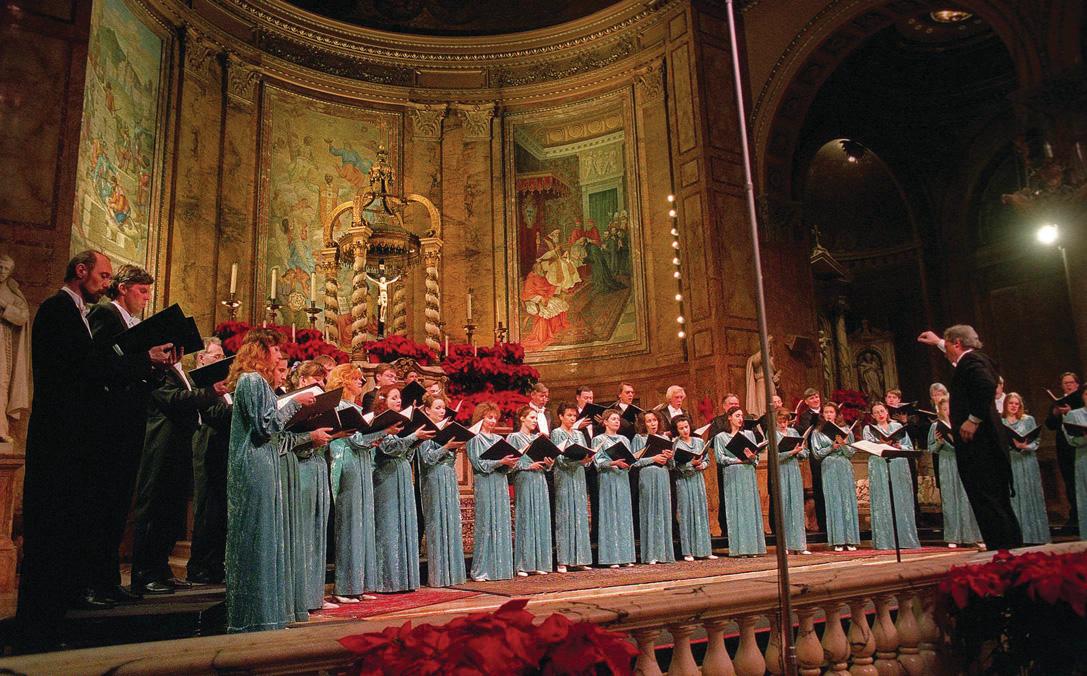
The work
World War I had been raging for less than a year when Rachmaninov's All-Night Vigil was premiered on 23 March 1915 (or 10 March, according to the pre-Revolutionary Russian calendar). The all-male voice Moscow Synodal Choir, presenting a charity concert in aid of the war wounded, had been given special permission to perform the work in Moscow's Great Hall of the Noble Assembly. With nationalist feelings running high and the public's appetite for Orthodox Church music growing, Rachmaninov's a cappella masterpiece was a hit; within a month, the choir gave four further performances. As Rachmaninov confessed some years afterwards, the Synodal Choir's performance 'gave me an hour of the happiest satisfaction... the magnificent Synodical singers produced any effect I had imagined, and even surpassed at times the ideal tone-picture I had had in my mind when composing this work.
هذه القصة مأخوذة من طبعة April 2023 من BBC Music Magazine.
ابدأ النسخة التجريبية المجانية من Magzter GOLD لمدة 7 أيام للوصول إلى آلاف القصص المتميزة المنسقة وأكثر من 9,000 مجلة وصحيفة.
بالفعل مشترك ? تسجيل الدخول
هذه القصة مأخوذة من طبعة April 2023 من BBC Music Magazine.
ابدأ النسخة التجريبية المجانية من Magzter GOLD لمدة 7 أيام للوصول إلى آلاف القصص المتميزة المنسقة وأكثر من 9,000 مجلة وصحيفة.
بالفعل مشترك? تسجيل الدخول

Discovering Donizetti - Thanks to a two-year lockdown project, nearly 200 previously lost Donizetti songs will now see the light of day
Thanks to a two-year lockdown project, nearly 200 previously lost Donizetti songs will now see the light of day. For most people, undertaking a lockdown project meant learning to bake sourdough bread, getting fit with Joe Wicks, or taking up a language. But Professor Roger Parker, the eminent historian of Italian opera and emeritus professor at King's College London, had something far more ambitious in mind. He set about unearthing songs by Gaetano Donizetti - many of which had been lost since the composer's lifetime - and the enterprise turned into a two-year labour of love.

Composer of the month - Bohuslav Martinů - Though the Czech absorbed many influences from his exile abroad, his colourful music was always distinctively his own
The youngest of six, Bohuslav was a sickly child, and his father or older sister often had to carry him the 193 steps up to the tower. He was shy at school, too, though showed an early talent for the violin and gave his first concert at 14. By the following year, the future composer was off to the Prague Conservatoire to take the first, if faltering, steps towards a career in music.

Symphonies Beside the Sea- Before cinema, the wireless and coach trips cast them adrift, seaside orchestras were once a major holiday attraction
Before cinema, the wireless and coach trips cast them adrift, seaside orchestras were once a major holiday attraction. It's a dimension of music-making that once was integral to many a British holiday experience, yet now has all but vanished. The tide went out, you might say, on the professional seaside (or pier, or spa) orchestra many decades ago. In their glory days, though - perhaps a quarter-century on either side of 1900-these ensembles were everywhere, from Bridlington to Eastbourne, New Brighton to Worthing, Blackpool to Bexhill-on-Sea, Cleethorpes to Brighton... the list is astonishing.

Richard Morrison- Do Classical Works About Mortality Reveal More To Us As We Get Older? Is it inevitably true that, as we journey through the decades, we are better able to interpret or empathise with a profoundly death-obsessed masterpiece such as Schubert's Winterreise?
As we get older do we respond differently to that vast canon of music dealing with mortality? Is it inevitably true that, as we journey through the decades, we are better able to interpret or empathise with a profoundly death-obsessed masterpiece such as Schubert's Winterreise? Or do human beings possess such a flexible sense of empathy that we can relate to virtually any state of mind if it is evoked convincingly enough by a composer?

Do Notes Win Votes? - There are multi-dimensional ways that music is used by political campaigners and their supporters today.
It was a little bit of history repeating when Rishi Sunak announced the UK General Election to the heckling of his political opponents blasting out D:Ream's 'Things Can Only Get Better'.

Västra Karup Sweden
The spirit of soprano Birgit Nilsson is alive and well in the town of her birth, home to a festival dedicated to her memory

Federico Colli
\"At this moment in time we don't need more virtuosi. We need musicians to engage with the philosophy of music

Harmonic Progression
What happens when classical music-style levels of ambition, invention and sheer length are brought to pop? The answer, as Meurig Bowen explains, is Prog Rock

Golden years
Young musicians may be physically fit, but with age come the advantages of wisdom and experience

Sweet Sixteen
As The Sixteen celebrates its 45th birthday, founder Harry Christophers speaks to Andrew Stewart about directing a choral powerhouse